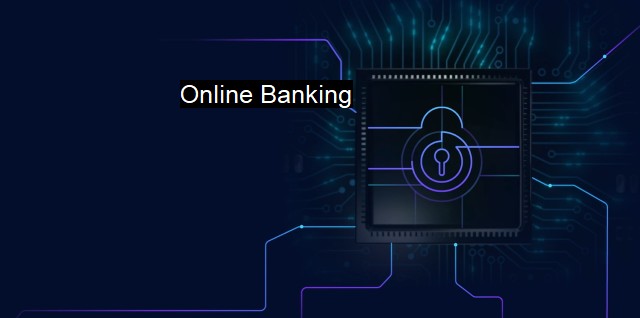What is Online Banking?
Balancing Convenience with Threats: The Impact of Online Banking and the Importance of Cybersecurity and Antivirus
Online Banking, also referred to as internet banking, is a digital payment system that allows customers and clients of respective banks, as well as other financial institutions, to conduct a variety of ever-essential financial transactions through the respective institution's website or app. with the evolution of technology and the digital space, cybersecurity and antivirus provision have become indispensable, not just for the banks, but also for customers.Today, in this high-speed era of robust technology, everyone is dependent on digital platforms for a number of activities, particularly for handling financial matters. Conducting banking transactions from the comfort of home, a passenger seat, or even while walking down the street has made life much easier and time-efficient for individuals. Whether it is money transfers, bill payments, or regular account checks, everything is achievable with a few clicks. as the options grow for consumers, so do the risks, with unauthorized access, phishing and malicious software posing real threats.
In context of cybersecurity and antivirus, it's imperative to understand just how concerning the situation can become if security is breached. Confidentiality, integrity, and availability -- the three essential components of information security, often referred to as the CIA triad -- must be protected efficiently. Unfortunately, the cyber world is full of threats that can disrupt the primary objective of smooth, risk-free online banking.
Cybersecurity threats mostly include potential cyber attacks, wherein offenders attempt to steal money directly from bank accounts, disrupt the online services deliberately, or steal/corrupt personal and sensitive data for monetary objectives. Malware, phishing, Denial-of-Service (DoS) exploits, Man-in-the-Middle (MitM) attacks, and even Advanced Persistent Threats (APTs) are all commonly encountered while using online banking services.
Both the banking sector and account holders need to prioritise cybersecurity. For a bank, the financial loss, loss of customers, damage to reputation, and potential violations of data protection regulations can engender severe ramifications if effective cybersecurity strategies are not implemented.
On the individual level, consumers must utilise antivirus software to ensure safe online transactions. Consumers associate online banking with a semblance of risk, but the experience can be made safer through the utilisation of robust cybersecurity strategies. Antivirus software plays a critical role here. This is a type of program designed to prevent, detect, and remove software viruses, as well as other malicious software like worms, trojans, adware, and more.
Antivirus software minimizes the risk of becoming a victim of financial theft or fraud while banking online. It fights off the risk of malware getting injected into mobile phones, computers, or any other device one uses for online banking. Malware can often lead to unauthorized access and tracking of all data, causing serious damage. Antivirus software monitors the system continually for any suspicious activities, scans all downloads and files for known malicious patterns, quarantines or deletes detected threats, and provides overall protection against hacking attempts.
Antivirus protection is one factor among many considerations in maintaining secure online banking practices. Among other vital steps are two-factor authentication (2FA), updating software regularly, using strong, unique passwords and changing them frequently, understanding phishing threats and avoiding clicking on suspicious links, and routinely monitoring accounts for any signs of unauthorized activity. Further, avoiding public WiFi for financial transactions also adds another layer of protection.
The convenience offered by Online Banking has not been without its challenges, primarily in the shape of cybersecurity threats. by taking individual precautions and via robust institutional safeguards such as antivirus protection, a secure, safe, and uninterrupted online banking experience can be achieved; one that augments rather than inhibits a consumer’s ease of performing financial transactions. While technology and cyber risks may evolve together, conscientious practices in cybersecurity can help to ensure that online banking continues to be a resource of significant convenience and rapid utility.

Online Banking FAQs
What is online banking and how does it relate to cybersecurity?
Online banking refers to the use of the internet to access and manage bank accounts. Cybersecurity is crucial in online banking as it involves sensitive data such as personal and financial information, making it a prime target for cybercriminals.What are the risks of online banking and how can I protect myself?
The risks of online banking include identity theft, phishing attacks, malware and other cyber threats. To protect yourself, use a strong password, ensure that your antivirus software is up to date, avoid using public Wi-Fi for banking, and monitor your account regularly for suspicious activity.Is it safe to use online banking on a mobile device?
Yes, it is safe to use online banking on a mobile device. However, make sure you download the official app from your bank's website or app store, use a strong password, and avoid using public Wi-Fi.What should I do if my online banking account is hacked?
If you suspect that your online banking account has been hacked, contact your bank immediately and report the incident. The bank may investigate the matter and take measures to protect your account. You should also change your password and monitor your account closely for any unauthorized transactions.| | A | | | B | | | C | | | D | | | E | | | F | | | G | | | H | | | I | | | J | | | K | | | L | | | M | |
| | N | | | O | | | P | | | Q | | | R | | | S | | | T | | | U | | | V | | | W | | | X | | | Y | | | Z | |
| | 1 | | | 2 | | | 3 | | | 4 | | | 7 | | | 8 | | |||||||